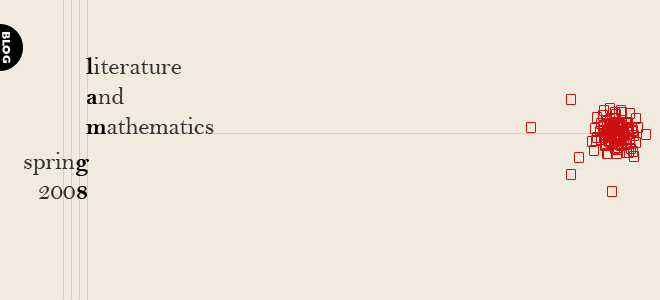Yesterday, my girlfriend and I watched the first film by George Lucas, THX 1138. I had never even really heard of the film before, but my girlfriend is trying to make the most of her Netflix membership before going off to med school and has an infinite queue of movies to watch. I'm sure others have made the connection between this and We before and I know it is not related to Pi or any current content, but I still found it to be very interesting.
The similarities between the movie and We were so frequent that I do not believe there is any way George Lucas could have never read We. The movie takes place in the future when the human race has apparently relocated to an underground dystopian society where sex is prohibited except for certain couples for the purpose of reproduction. The characters are identified by a string of letters as their "prefix" and then a number that follows the letters. Also, the members of the society take pills to supress their emotions and personality. Their world is constantly patrolled by faceless android policemen, reminiscent of the guardians of We, and those in violation of the rules (drug violation, unpermitted sex, etc) are usually destroyed. THX and his roommate both violate the drug laws and begin to have a relationship with each other and end up having sex illegally. After they stop taking the drugs they decide they want to escape the underground society in which they live.
I read reviews of the movie online and many found it to be boring and bleak, but I couldn't help but be drawn in simply by the similarity to We and Vas and the topics we have been discussing this semester. It really made me wonder what attracts people to these themes and topics. Why are we so interested in stories like We, 1984, and THX 1138 and what makes writers create these stories? Is it simply the fear of ending up in a society such as these, or just a desire to experience something other than our dull day to day lives?
Monday, March 31, 2008
Buy More Now and Be Happy
Subscribe to:
Post Comments (Atom)

4 comments:
I can't really say why people are attracted to these types of stories. But my family as well as my friends seem to intuitively believe in sci-fi and/or dystopian literature's importance. You might check out the film: Light Years if you're into this kind of stuff. As for your questions, again, I cite Nietzsche (like Aristotle before, I'm reading this for a class, so it's fresh in my mind) :
"These English psychologists -- just what do they want? You always find them at the same task, whether they want to or not, pushing the partie honteuse [shameful part] of our inner world to the foreground, and looking for what is really effective, guiding and decisive for our development where man's intellectual pride would least wish to find it[...]what is it that actually drives these psychologists in precisely this direction all the time? Is it a secret, malicious, mean instinct to belittle humans, which it might well not admit to itself? Or perhaps a pessimistic suspicion, the mistrust of disillusioned, surly idealists who have turned poisonous and green? Or a certain subterranean animosity and rancune (rancor) towards Christianity (and Plato), which has perhaps not even passed the threshold of consciousness? Or even a lewd taste for the strange, for the painful paradox, for the dubious and nonsensical in life? Or finally-- a bit of everything, a bit of meanness, a bit of gloominess, a bit of anti-Christianity, a bit of a thrill and need for pepper?"
Now you might not think that's apropos, I'm not even sure if it is, but I think often sci-fi is connected with the common human obsession with dysfunction.
I think dystopia movies and books are a nerdy version of scary movies of sorts. For people less interested in math and sciences Doomsday appears in the form of zombies or disease or world wars. A dystopia sets the focus more on self destruction through technological development. Most people would probably find this type of movie uninteresting but to more technical minded people it does have the creepy effect of wondering if our future society could function like those in We or 1984.
This isn't really a comment on your post but kind of my own reflection on the topic, but props because your post got me thinking.
Very interesting that you bring up that movie, I've always meant to check it out. Wasn't Lucas still in film school when he made that? But you're right, it definitely appeals to people. Maybe it's because it appeals to our freedom instinct, and kind of reaffirms that we're not crazy to dislike being controlled by some aspect of a society, especially since a lot of these stories are just grounded enough to be conceivable.
well i think they're made, at least the original works, in order to make people appreciate freedoms we do have in our societies, despite the problems we have, and to make people aware of what drastically changing the structure of our societies could cause....ex. We -- what problems communism could lead to and why certain communist ideas are ridiculous.. i think we like such works of fiction because they do make us appreciate the good things we have in our societies
Post a Comment